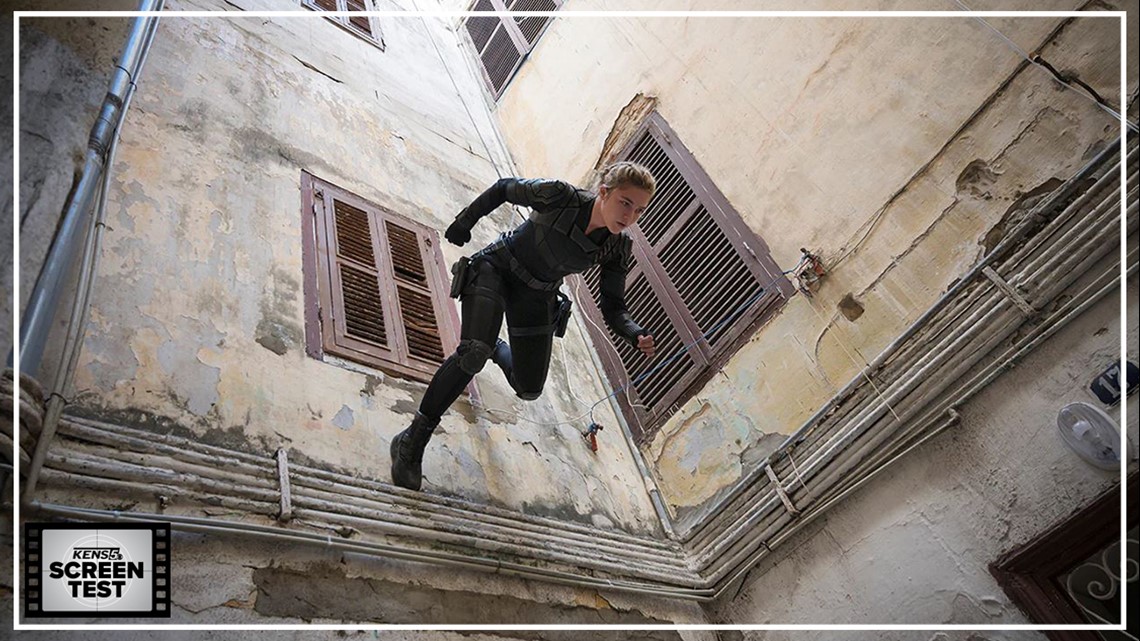SAN ANTONIO — “Never turn your back on family,” Dominic Toretto has made a point of teaching over the years, and before you leave thinking you’ve clicked the wrong review, consider that the ethos of two of this summer’s biggest punch-smash-swerve epics is a double-helix of big-top action and fractured clans. This isn’t a spoiler in the case of the upcoming “Black Widow”; you might’ve noticed how both “F9” and the latest Marvel Cinematic Universe adventure have focused their marketing optics on sibling reunions where black eyes are given in lieu of hugs. Family means something else in movies when the budget hits six figures, it seems.
In the MCU, for instance, family means pining for the days of undercover operations masked as domestic bliss; of reminiscing in a remote safehouse while decked out in combat attire; of bickering about the extent to which one’s superhuman abilities have actually brought about some good; of extraordinary circumstances recognized as the closest thing you’ve ever had to merely living in the world and not trying to save it.
Such is the kind of “family” – one not of blood relatives but of disparate, desperate operators – we discover in “Black Widow’s” best scene. It’s an extended dialogue-driven trip down memory lane and present-day reckoning; and also one of the rare Marvel moments where character convincingly propels the story instead of cataclysmic timers and axis-shifting revelations. Scarlett Johansson’s red-headed assassin Natasha Romanoff is here, as are MCU newcomers Florence Pugh, stealing scenes as Natasha’s sister, the only-slightly less deadly Yelena; the reliably wonderful Rachel Weisz as intelligent surrogate mother Melina; and the playful David Harbour as buff Alexei, a former Cold War-era supersoldier annoyed that Captain America got all the glory.
MCU conductor Kevin Feige may have turned expansion of this universe from marvelous accomplishment to expectation over 13 years, yet it’s still impressive (if not increasingly burdensome) how Marvel’s architects manage to locate smaller stories which are more leather glove than gauntlet within the folds. This isn’t to say the MCU’s 24th movie doesn’t end by confirming a long-running rule that large objects in the clouds will eventually meet the ground below, but “Black Widow” (out Friday, in theaters as well as Disney+ so long as you cough up a $30 premiere access fee) is a dioramic entry more than an expansive one. It’s intermittently loud and quiet, moderately successful at justifying the whiplash, but at its most thoughtful when embracing itself as the MCU’s most legitimate attempt at disentangling twisted definitions of family and loyalty.
Of course, where “thoughtful” equates with “entertaining” is in the eye of the MCU-starved beholder, and “Black Widow” – the overdue first solo outing for the titular Avenger, directed by Aussie filmmaker Cate Shortland – cemented itself as another likely success when its trailer showed Natasha hurtling through the air and fighting a mysterious masked antagonist meant to bait eager comic fanboys. This is still a roughly two-hour superhero affair, which means it will be filled out by exciting but sometimes overstated action choreography and a sense of personality that tends to favor characters’ sense of humor on a scene-to-scene basis over any other aspects of their worldview. Indeed, much of the first two acts – chronicling the reunion of Natasha’s sort-of family and, less potently, a search for her real one – make the case that “Black Widow” is as much a family dramedy as an action extravaganza hurtling towards confrontations with mustache-twirling maniacs.
It may take you a second to get your bearings straight here; passing mention of the Sokovia Accords and an appearance by William Hurt’s General Ross unfurl like sense memory amid momentary displacement. Thanks to some guidepost references to a splintered Avengers team, it eventually becomes clear we’re in post-“Captain American: Civil War” territory, which explains why Natasha is alone, on the run and searching for purpose, let alone some kind of companionship beyond her trustworthy handler.
It goes without saying that these narrative blueprints provide a refreshing change of pace from the cosmic stakes of “Infinity War” and “Endgame,” and “Black Widow” has a way of deftly harmonizing mystery with visceral thrill. The way Natasha is haunted by a past where questions are as inscrutable as answers echoes “The Bourne Identity,” and in the movie’s espionage-laden schematics and eventual face-concealing tricks we might spot a homage to the “Mission: Impossible” flicks.
At the same time, consequences are nonetheless swelled by our knowledge regarding Natasha’s fate in the climax of the Avengers odyssey. It’s tempting to think the muted legacy of her sacrifice in the stars compared to Tony Stark’s messionic final act is due to a relative obscurity about the character. “Black Widow,” if we’re being a bit generous, feels like an attempt at course-correction while sketching in the background of a figure not nearly as revered as Iron Man or Cap or Thor, let alone not nearly as considered by the MCU powers that be.
To that end, the movie starts off grounded by a more conspiratorial air than the most recent MCU entries. Even the most hardened Marvel aficionado may find themselves a bit disarmed by its Amblin-esque opening minutes, in which our core quarter daringly escapes from unknown forces in 1995 suburbia. We can practically see childhood innocence wisped away the moment a clean-faced, American-accented Harbour waltzes in under a dark cloud. It’s a fantastically staged opening setting up the diverting paths young Natasha and Yelena will take, providing a thematic foundation for the dilemmas of lost autonomy peppering the developments to come.
The interpersonal tension between Natasha, Yelena, Melina and Alexei will continue to be rooted in that prologue, and executed in Eric Pearson’s screenplay with equal amounts of laughs and rough-hewn sincerity (“Where’s an Avenger when you need one?”). Scattered among our various Wait, who?s and What’s that?s of inevitable dastardly schemes is a movie which seems to earnestly be putting character first. Even as mind control plot devices are introduced with literal spurts of red pixie dust, Pearson both amuses and energizes in stretching the dynamics between the lead characters. It’s moving to consider the way they’ve become foils to each other while still nostalgically attached to the same point of no return all those years ago.


An excellent Pugh, already a star thanks to her 2019 turns in “Midsommar” and “Little Women,” is the standout; she brings a weariness and restrained anger to Yelena that will make you believe, for once, that there’s more at stake for the residents of the MCU than twinkling jewels and hero complexes. What Yelena goes through here, alas, in her MCU debut, amounts to only a partial arc.
But it’s also too easy to admit her journey is ultimately more interesting than Natasha’s, following a messy and largely lifeless third act in a steel skybound lair, a climax ultimately more effective at providing payoffs to running gags than believable catharsis for our beloved Black Widow. Should we expect such an about-face from a commercial Marvel machine which will always hunger for the tinge of spectacle? Perhaps. And perhaps even after 24 movies (and two whole years without one) it becomes enticing to imagine that one of these MCU jaunts which starts close to Earth may end close to Earth too.
“Black Widow” takes the dream further than other, more fanciful Marvel fare, but an unintentional irony otherwise stings our aftertaste—Natasha begins her present-day story with a search for closure and ostensibly locates it, but we’re left unable to recognize it for ourselves when explosions and unwieldy conspiracies snatch our attention. No matter: There’s a post-credits stinger nudging us to look ever ahead. The beat goes on.
"Black Widow" is rated PG-13 for intense sequences of violence/action, some language and thematic material. It's available Friday in theaters as well as on Disney+ with premiere access.
Starring: Scarlett Johansson, Florence Pugh, David Harbour, Rachel Weisz
Directed by Cate Shortland
2021
MORE REVIEWS:
- ‘No Sudden Move’ Review: Steven Soderbergh reasserts himself as master of the caper
- ‘The Tomorrow War’ Review: A sci-fi mashup as derivative as its title suggests
- ‘The Sparks Brothers’ Review: An odd and operatic documentary about an odd and operatic musical duo
- 'Luca' Review: Don't overlook one of Pixar's simplest, most human tales
- ‘In the Heights’ Review: The diaspora of dreams
- ‘Cruella’ Review: Disney attempts to give a dastardly villain her due

